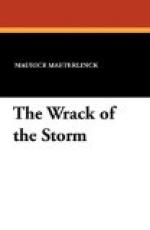lasting truth, we must learn to view the great masses
and the great feelings of mankind from above.
It is in them and in their great and simple movements
that the will of the soul and of destiny is asserted,
for these two form the eternal substance of a people.
And, in the present case, the movement of the great
masses and the great feelings of the people took the
form of an immense impulse of sympathy and indignation,
which gradually increased, penetrating farther and
farther into the popular strata and gathering volume
as it progressed, until it urged a whole nation to
assume the burden of a war which it knew to be crushing
and merciless, a war which each of those who called
for it knew to be a war which he himself must wage,
with his own hands, with his own body, a war which
would wrest him from the pleasant ways of peace, from
his labours and his comforts, which would weigh terribly
upon all those whom he loved, which would expose him
for weeks, perhaps for months, to incredible sufferings
and which meant almost certain death to a third or
a half of those who demanded the right to brave it.
And all this, I repeat, occurred without any material
necessity, from no other motive than a fine sense
of honour and a magnificent surge of admiration and
pity for a small foreign nation that was being unjustly
martyred. We cannot repeat it too often:
here, as in the case of the sacrifice which Belgium
and England offered to the ideal of honour, is a new
and unprecedented fact in history.
FOOTNOTES:
[Footnote 4: Delivered in London, at the Queen’s
Hall, 7 July, 1915.]
* * * *
*
BELGIUM’S FLAG DAY
IX
BELGIUM’S FLAG DAY
1
To-day our flag will quiver in every French hand as
a symbol of love and gratitude. This day should
be a day of hope and glory for all Belgium.
Let us forget for a moment our terrible distress;
let us forget our plains and meadows, the fairest
and most fertile in Europe, now ravaged to such a
degree that the utmost that one can say is powerless
to give any idea of a desolation which seems irremediable.
Let us forget—if to forget them be possible—the
women, the children, the old men, peaceable and innocent,
who have been massacred in their thousands, the tale
of whom will amaze the world when once the grim barrier
is broken behind which so many secret horrors are being
committed. Let us forget those who are dying of
hunger in our country, a land without harvests and
without homes, a land methodically taxed, pillaged
and crushed until it is drained of the last drop of
its life-blood. Let us forget those remnants
of our people who are scattered hither and thither,
who have trodden the path of exile, who are living
on public charity, which, though it show itself full




